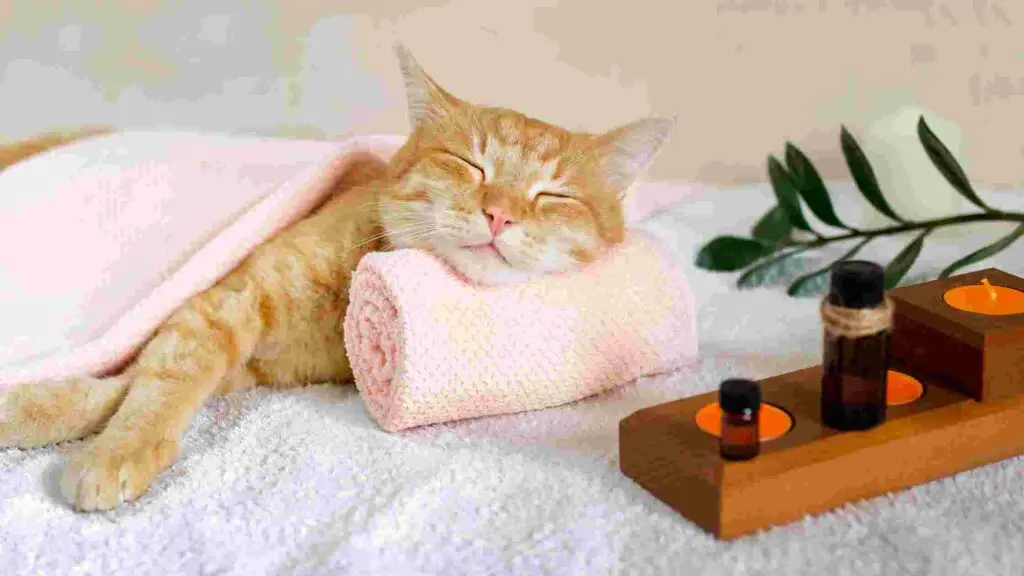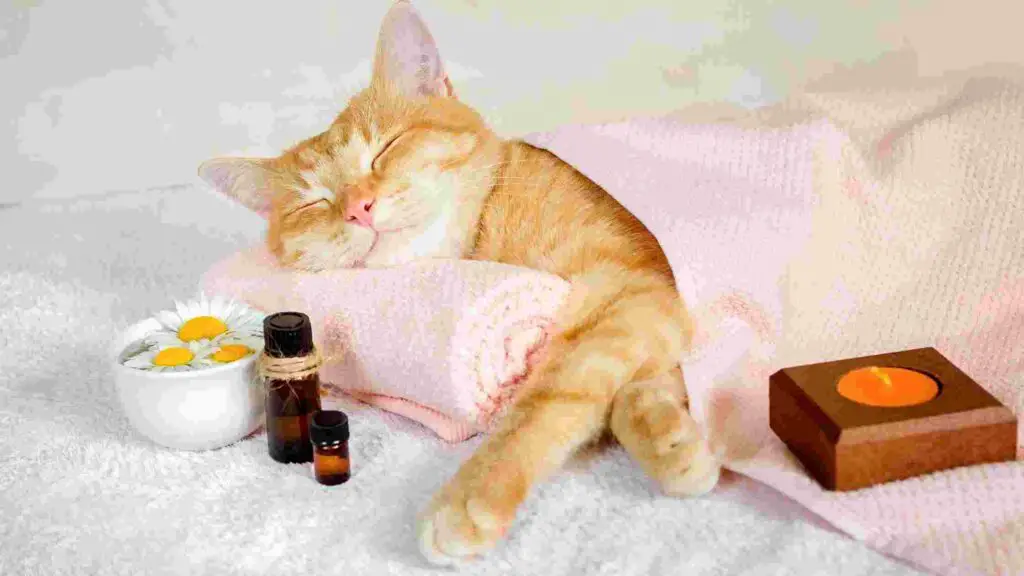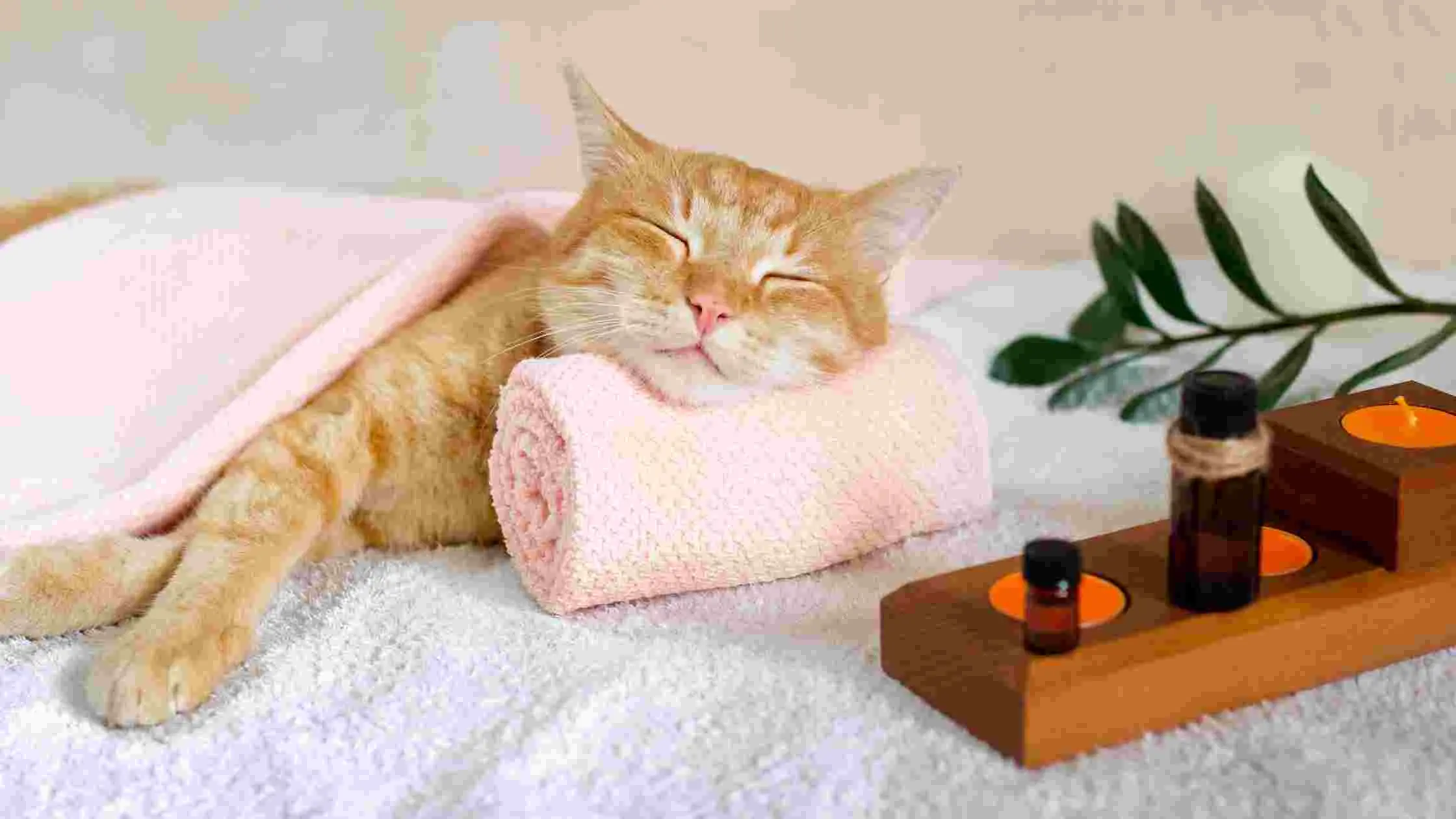Essential oils, such as rose, lavender, etc., are extracts of plants noted for their fragrant and/or therapeutic characteristics. Aromatherapy is inhaling diffused oil or using it physically, such as during a massage. When inhaled, the fragrance molecules in essential oils travel directly to the brain and have a powerful impact on the amygdala, the brain’s emotional center. Essential oils are more accessible than ever before, thanks to increased online retailers and a renewed interest in natural health care. Cleaning spray, hand sanitizer, scent, laundry, and skin moisturizers are just a few examples of how people are adopting them into their daily lives. Are Essential Oils Safe For Cats?
In short, established investigation has indicated that essential oils can be poisonous to cats, whether taken internally, used to the skin, or inhaled. Exposure can lead to severe liver damage, liver failure, respiratory failure, seizures, and even death.

While essential oils, aromatherapy, and potpourri may be relaxing for you, the natural elements in these scents might be harmful to your cat. Use caution when using these products to avoid causing a toxic reaction in your cat.
Are essential oils safe for cats?
When it comes to using essential oils, whether for yourself or for your pets, the oil’s quality is critical. Unadulterated, authentic, and pure essential oils are safe. While many fats are labeled “organic,” “natural,” or even “certified pure,” you still need to be cautious since essential oils are not regulated. Essential oils, unlike other pharmaceuticals, are not regulated by the FDA.
Young Living essential oils are the brand we recommend since we know they are high-quality pure oils that are safe to use on yourself and your pets. Cats do not metabolize things the same way humans do, so you must be cautious about what oils you use on them or expose them to.
The P450 cytochrome metabolic pathway is not present in a cat’s liver. This means that certain pharmaceuticals, treatments, and even essential oils cannot be broken down or metabolized by the liver of cats. If you want to use essential oils for your cat, only do so under your veterinarian’s supervision and/or direction.
How Essential Oils are toxic to Cats?

Recognizing and adhering to your cat’s specific environmental and nutritional sensitivities is essential for responsible pet care. Even though humans commonly use the following essential oils for relaxation or other purposes, you should steer clear of them if you have feline friends under your roof.
Essential oils, like common houseplants that are toxic to cats, are dangerous in small doses and even more so when concentrated. The following are just a few of the essential oils that are poisonous to cats, according to the Canadian Veterinary Medicine Association (CVMA):
These oils are known to be hazardous to cats because they contain phenols:
- Oil of wintergreen
- Oil of peppermint
- Citrus essential oil (including lemon oil)
- Tea tree oil is a natural antiseptic also known as melaleuca oil
- Pine oil is a type of essential oil that is
- Eucalyptus essential oil
- Cinnamon essential oil
- Oil of pennyroyal
- Oil of sweet birch
- Clove essential oil
- Ylang ylang essential oil
- Juniper oil
- Menthol oils or mint oils
The aroma of these oils irritates most cats. While you may be tempted to spray these oils around locations where your cat is urine marking or jumping where they shouldn’t, these items are poisonous to cats and should be avoided. Consider a safe and effective alternative, such as Feliway pheromone spray or diffuser, to help soothe your cat and avoid undesired destructive habits.
The bigger the risk to your cat, the larger the essential oil concentration. If your cat ingests any oils accidentally, take him to the clinic right once.
This isn’t an exhaustive list, and it doesn’t apply to every pet. Every animal, like people, is unique and has its own molecular makeup that will react differently to stimuli. This list, however, might be helpful to include in your pet’s first-aid kit.
If you’re a worried pet parent who wants to diffuse essential oils, go to a holistic veterinarian or a pet aromatherapist to learn how to safely utilize pure essential oils with your cats.
Which Essential Oils Likely To Be Safe for Cats
The following essential oils are suitable for cats:
- Lavender oil
- Frankincense oil
- Chamomile oil
- Jasmine oil
- Rose oil
Others, see an aromatherapy specialist for your pet. If you’re diffusing blends you bought, check the ingredients to ensure they don’t contain any potentially harmful oils.
If you’re going to diffuse essential oils, be sure your pet can get away from them. If it bothers them, they’ll leave the room, and ideally, they’ll be able to get some fresh air. Using different approaches, you can also help your pet deal with anxiety or other challenges.
Signs of Oil Toxicity in Cats
The following are some of the signs and symptoms of essential oil poisoning:
- Drooling
- Difficulty Breathing, open mouth breathing
- Weakness
- They have difficulty walking
- Staggering and stumbling at times (this can indicate a problem with the central nervous system)
- Vomiting
- Damage to the Liver
- Irritation of the Skin
- Collapse or seizures
- Lethargy, depression, or dullness in cat
If you’ve used essential oils topically on your pet, wash it off as thoroughly as possible. Turn off the diffuser, get your pet out into the fresh air, and call the pet poison helpline if you’re diffusing oils.
Essential oils are potent medicines that should be used with caution around pets. Before experimenting with essential oils, always visit a veterinarian or a pet aromatherapy expert, And always carefully use diffusers with essential oil.
In what ways are Essential oils hazardous to cats?
Essential oils can be dangerous to cats if they come into contact with them on their skin, swallow them, or inhale them. Essential oils can cause catastrophic organ damage in cats, including liver failure, seizures, and even death if they come into touch with them in these ways. Oils that come into direct touch with cats’ skin are absorbed, and inhaling oil that has been diffused in the air can cause respiratory problems. They can also collect on your cat’s fur, causing him to consume them when licking and cleaning. Toxicity can develop fast or over a long period.
You should never apply essential oils to your cat’s fur or skin. Your cat could lick the fat off their fur and swallow it as they groom and be absorbed via the skin.
Inhaling essential oils from reed diffusers or plugin diffusers can be hazardous to cats and have psychological consequences. However, because the oils are frequently diluted, the results are uncommon.
What are some ways your cat can be exposed to essential oils?
Essential oils that you use for personal reasons may come into contact with your cat. Keep any essential oils in a cat-proof cabinet out of reach of your curious feline. Passive reed diffusers or potpourri pots can be knocked over, exposing your cat to oil-containing liquid that can be swallowed or absorbed through contact on its skin or fur. If you’ve used essential oil-containing items on your skin, don’t let your pet lick it.
Airborne essential oils can be inhaled by cats through diffusers, candles, liquid potpourri items, and room sprays, causing respiratory discomfort. There is oil in the air if you can smell its scent, and it can impact your cat.
It is not recommended to use essential oil diffusers in rooms with kittens, elderly cats, or cats with liver or respiratory problems. When you’re around your cat, avoid wearing critical oils.
Keep Essential Oils Away from your cat
It’s a poor idea to presume that what’s safe for the pet parent is also safe for the pet when it comes to essential oils. Due to metabolic variations, the same oil that we can enjoy without adverse effects in humans might cause GI distress, chemical scorching of the mouth or esophagus, respiratory, neurologic, and liver damage in our dogs. Death may occur in severe circumstances.
The harmful effects of essential oils are extremely dangerous to cats. Cats are more likely to acquire toxicity when oils collect on their skin or fur because they are meticulous groomers.
In such instances, oils enter the body by inhalation, ingestion, and skin contact all at the same time, quickly reaching dangerous levels in the circulation. Because cats lack the enzymes needed for the liver to digest and expel toxins, pet parents should avoid using oral, topical, and other inhalation oils around them.
Essential oil use should be avoided around dogs and cats with liver issues, elderly pets, puppies and kittens, pregnant or nursing animals, and pets with respiratory ailments (including asthma and bronchitis). Furthermore, avoid direct dermal contact with such oils for pets with open wounds or sores, as the damaged skin may allow for faster absorption.
Skin is a big no-no when applying essential oils to your pet’s sensitive parts, such as their eyes, ears, nose, and genitals. Let your veterinarian handle the treatment. Any potential advantage is vastly outweighed by the risks.
How can I limit the risk to my cat if I use essential oils for myself?
There are several things you may do to reduce your cat’s danger of coming into touch with harmful oils:
- Always keep essential oils out of your cat’s reach. Make sure all essential oils are stored out of reach of curious paws, which may seem self-evident.
- After handling essential oils, avoid touching your cat. If you come into contact with undiluted essential oils, make sure you properly wash your hands before petting your cat.
- Cleaning with essential oils is not a good idea. Cleaning with undiluted essential oils is not recommended. Cats like to rub up against everything, and it’s easy for them to get on their fur.
- Use oils that have been severely diluted. If you’re going to use essential oils for yourself or around the house, make sure they’re cut first to keep your cat safe.
- Diffusers should be kept away from your cat. Keep your cat out of those rooms if you use essential oils and employ reed diffusers, plugin diffusers, or a nebulizer. Before allowing your cat back in, make sure any area where essential oils have been diffused is adequately ventilated.
- Use a flea treatment that comes with a prescription. Manufacturers can add essential oils to items for your pets since essential oils aren’t well-regulated. Over-the-counter flea remedies frequently include an essential oil to assist “repel” fleas. They are potentially less effective than other drugs and may pose a risk to your pet, always recommend seeking a prescription flea treatment from your veterinarian or a pharmacist.
What precautions should be taken to keep cats safe when using essential oils?
You can take several necessary actions to lessen the danger of harm to your cat if you use essential oils at home.
- Keep any containers securely fastened and out of reach of your cat to avoid them coming into contact with any accidental spills from leaky bottles.
- After handling essential oils, wash your hands. If you contact or stroke your cat with crucial oil residue on your hands, it could transfer to their fur and be licked off.
- Only use heavily diluted essential oils – Using essential oils in low quantities will assist in reducing the risks to your cat.
- Keep your cat out of the room if you’re using reed or plugin diffusers, and then make sure the room is thoroughly ventilated before allowing the cat back in.
- Cleaning with essential oils is not recommended since cats like to rub against objects, and rubbing against something you’ve cleaned with essential oils could cause them to get it on their fur.
- Use only prescription flea treatments – Essential oils can be found in specific over-the-counter flea remedies to ‘help keep flies away.’ These are less effective than other medications and can be dangerous to your cat, so always use products that have been prescribed by your veterinarian or pharmacist.
- Only use reputed brands of pet-safe essential oils, and dilute them adequately with a pet-friendly carrier oil before giving them to your dog or cat. Avoid using it among animals that are more vulnerable to negative consequences. Also, never feed or apply a highly concentrated product to your pet.
- Essential oils should not be added to your pet’s food.
- Before handling your dog or cat, always wash your hands after using an essential oil product on yourself, such as perfume or massage oil. Allowing your pet to lick your skin or clothing development is also not a good idea.
Treatment of essential oil poisoning
- If your cat’s respiratory irritation is minimal after inhaling an essential oil, relocate them to a fresh air place.
- If an essential oil comes into touch with your pet’s skin or fur, use a pet-safe dishwashing detergent to clean the area.
- Consult your veterinarian or a poison control center if your dog or cat has consumed an essential oil, and do not force yourself to vomit.
If you are concerned that your pet is suffering from essential oil poisoning or toxicity and has not improved or is displaying severe signs after performing the steps above, contact your nearest open veterinarian clinic or emergency hospital, or call a poison control hotline.
Bring the essential oil product to your appointment if your physician recommends therapy to help your veterinarian identify the dangerous chemical and dose. A physical checkup and bloodwork will be performed by your veterinarian.
If your cat has trouble breathing, oxygen will be given to him. If chemical burns to the mouth or esophagus have occurred, a feeding tube may be implanted for a few days while the injury heals. Depending on the severity of your pet’s poisoning, fluids, IV lipid treatment, and supportive care may be offered. You may need to stay in the hospital for several days.
When to Consult a Vet
Difficulty breathing, coughing, wheezing, drooling, vomiting, tremors, wobbliness, and a low heart rate are all symptoms of essential oil toxicity. If you suspect your cat has consumed a crucial oil, contact your veterinarian or an emergency clinic right away, and stop using any essential oil that causes irritation or discomfort for your cat.
Consult your veterinarian before using essential oil products or diffusers in your house to ensure your pet’s health and safety.
Conclusion
The oil used in a diffuser is highly diluted, so it should not concern your cat if you diffuse oils at home (instead of applying it directly to the skin or providing it with supplements). You should never leave your cat alone in a room where essential oils are diffused. Ensure that the cat has a way out of the room to avoid the diffuser.
We feel that the risks of using essential oil diffusers in your house outweigh the advantages, particularly if you have curious dogs. Although we don’t explicitly advise against using these oils, we recommend that you approach them with caution. The type of essential oil, the dosage, and the route of administration are all significant factors to consider. Please visit your veterinarian if you have any questions or concerns about using essential oil for your cat or diffusing it in your home around your cat.
References
- https://apvet.com/ feline-care/ essential-oils-cats
- https://www.hillspet.com/ cat-care/routine-care/ essential-oils-for-cats
